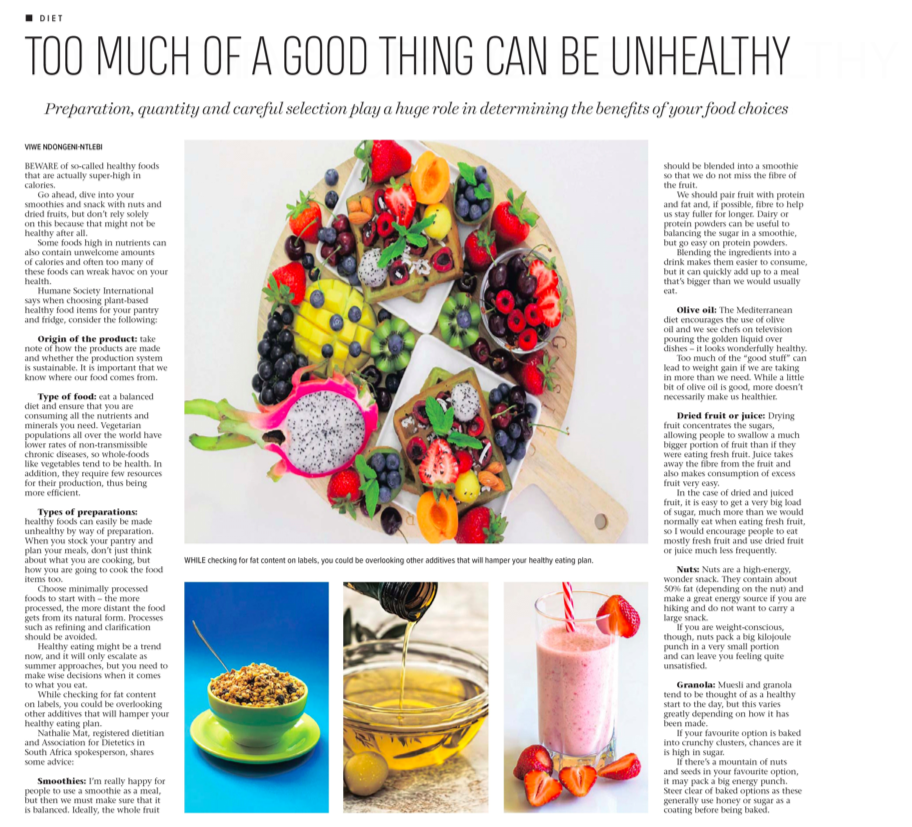How healthy are your healthy food choices?
When stocking up your plant-based pantry and planning your weekly meals, it is important to consider what a balanced diet includes. Our bodies need protein, carbohydrates, healthy fats, vitamins, minerals and enough calories to function, however, the ratio of these nutrients needs to be taken into consideration. While “largely vegetarian diets are as healthy as you can get”, we need to remember to consume a variety of plant-based food items that contain the most nutrients per calorie. Humane Society International-Africa spoke to Pretoria News about what we need to take into consideration when we choose healthy food options.
There are many healthy and delicious plant-based food items that are also high in calories. Some examples of high-caloric plant-based foods include seeds and nuts (including peanuts, cashew nuts, pistachio), avocado, coconut, soybeans, and flaxseed. Why are fatty foods higher in calories? Well, all foods have fractions of carbohydrates, proteins, and fats. Carbohydrates and proteins contain 4 kilocalories per gram, while fats have 9 kilocalories per gram – so surprisingly, the high-fat foods are actually more caloric than starches. Nutrition experts around the world advocate eating more fruits, vegetables, and whole grains to improve overall health and prevent disease. According to the 2016 South Africa Demographic and Health Survey Report, 27% of women in South Africa are overweight and 41% are obese and 20% of men are overweight while 11% are obese. Studies show that individuals who eat a whole-food plant-based diet on average have lower body weights, and a decreased risk of diabetes, cardiovascular disease, obesity, dementia, and high blood pressure. A plant-based diet rich in foods such as fruits, vegetables, whole grains and legumes may protect, treat and even reverse some of the world’s chronic diseases. According to the World Health Organisation, chronic diseases accounted for 29% of all deaths in South Africa in 2008 – 18% alone due to cardiovascular disease and cancers.
When choosing healthy, plant-based food items for your pantry and fridge, consider the following:
- Origin of the product: Take note about how the products are made and whether the production system is sustainable. It is important that we know where our food comes from.
- Type of food: eat a balanced diet and ensure that you are consuming all the nutrients and minerals you need. As mentioned, vegetarian populations all over the world have lower rates of non-transmissible chronic diseases. Keep track of the nutrients and calories you consume by making use of online apps like Dr Michael Greger’s Daily Dozen or Chronometer.
- Types of preparations: Healthy foods can easily be made unhealthy by way of preparation. When you stock up your pantry and plan your meal, don’t just think about what you are cooking, but how you are going to cook the food items too. Choose minimally processed foods to start with – the more processes we have, the more distant the food gets from its natural form. Processes such as refining, clarification and acid attacks should be avoided.
More tips on making eating healthier easier:
- The easiest way to ensure you eat more plants is to stock up your pantry and fridge. Root vegetables (like potatoes, sweet potatoes, beetroot and onions) can be bought in advance, but fresh fruit and leafy greens should be bought weekly. Buy wholegrains (brown rice, whole wheat pasta and quinoa), legumes (dry lentils and dry or canned beans and chickpeas) and other go-to items (like boxed nut milk and dried dates) in bulk and keep a few frozen fruits and vegetables options (spinach, banana, berries, peas, corn) in your freezer in case you run out of your fresh stock.
- One of the easiest ways to eat multiple portions of fruits and vegetables in one go, is to blend it into a smoothie or soup. By adding a small handful of spinach, kale, cauliflower or broccoli to your smoothie, you reap all the benefits, but won’t even notice the taste.
- Cook your favourite recipes, like your mom’s lasagna or chicken a la king, and try swapping some of the animal-derived products (meat, dairy and eggs) with plant-based alternatives. Dairy milk and cheese can easily be swapped for soy or nut milk and coconut oil – based cheese and meat can be replaced with veggies like mushrooms, aubergine, baby marrow or meat alternatives.
- Always try to add an extra portion of vegetables to your every-day meals, like sandwiches, wraps, pastas and stews. It is an easy way to get more nutrition without compromising the taste of your dish. Baby spinach, tomatoes, carrots, beetroot and sundried tomatoes are merely some of the vegetables that are easy to add to dishes. Legumes, including chickpeas, black beans and lentils, are also great to bulk up meals and add nutritional value.
For delicious and healthy recipes, visit www.greenmonday.co.za.



